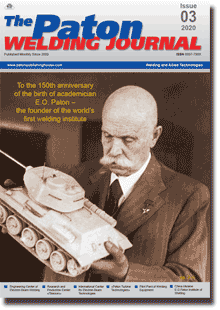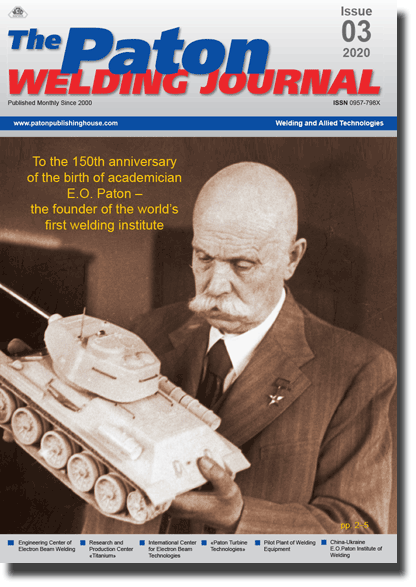| 2020 №03 (05) |
DOI of Article 10.37434/tpwj2020.03.01 |
2020 №03 (02) |

The Paton Welding Journal, 2020, #3, 6-12 pages
Use of steels of the strength class C350–C490 in the production of building welded structures
V.D. Poznyakov
E.O. Paton Electric Welding Institute of the NAS of Ukraine 11 Kazymyr Malevych Str., 03150, Kyiv, Ukraine. E-mail: office@paton.kiev.ua
Abstract
The effect of thermal cycles of arc welding on the structure and mechanical properties of metal of the heat-affected zone of welded joints of microalloyed structural steels of the strength class from c350 to c490 was investigated. it was established that as a result of the action of thermal cycles of welding, metal structure of the heat-affected zone of most microalloyed steels of the strength class from c350 to c490, except for steel 09g2syuch, remains stable bainite in a wide range of cooling rates, and mechanical properties do not change significantly. as a result of welding, at moderate cooling rates the structure of the heat-affected zone metal in the steel 09g2syuch can change from bainitic to bainitomartensitic and martensitic as the metal cooling rate increases. as a result of that, the values of static strength and impact toughness of the metal are increasing and its ductile properties are reduced. 12 ref., 5 Tables, 7 Figures.
Keywords: structural steels, thermal cycle of welding, metal structure, mechanical properties, welded building structures
Received 17.01.2020
References
1. Zhdanov, S.L., Poznyakov, V.D., Maksimenko, A.A. Dovzhenko, V.A. et al. (2010) Structure and properties of arc-welded joints on steel 10G2FB. The Paton Welding J., 8-12.2. Poznyakov, V.D., Zhdanov, S.L., Maksimenko, A.A. et al. (2013) Weldability of sparcely-alloyed steels 06GBD and 06G2B. Ibid., 4, 8-14.
3. Poznyakov, V.D., Zhdanov, S.L., Maksimenko, A.A. (2012) Structure and properties of welded joints of steel S390 (S355 J2). Ibid., 8, 6-10.
4. Poznyakov, V.D., Zhdanov, S.L., Zavdoveev, A.V. et al. (2016) Weldability of high-strength microalloyed steel S460M. Ibid., 12, 23-30. https://doi.org/10.15407/as2016.12.04
5. Mikhoduj, L.I., Kirian, V.I., Poznyakov, V.D. et al. (2003) Sparsely-alloyed high-strength steels for welded structures. Ibid., 5, 34-37.
6. Ufuah, E. (2013) Elevated temperature mechanical properties of butt-welded connections made with high-strength steel grades S355 and S460M. In: Proc. of Int. Conf on Design, Fabrication and Economy of Metal Structures (Miskolc, Hungary, April 24-26), 407-412. https://doi.org/10.1007/978-3-642-36691-8_62
7. Nazarov, A., Yakushev, E., Shabalov, I. et al. (2014) Comparison of weldability of high-strength pipe steels microalloyed with niobium and vanadium. Metallurgist, 7(9-10), 911-917. https://doi.org/10.1007/s11015-014-9821-6
8. Ragu Nathan, S., Balasubramanian, V., Malarvizhi, S., Rao, A.G. (2015) Effect of welding processes on mechanical and microstructural characteristics of high strength low alloy naval grade steel joints. Defense Technology, 11, 308-317. https://doi.org/10.1016/j.dt.2015.06.001
9. Show. B.K., Veerababu, R., Balamuralikrishnan, R., Malakondaiah, G. (2010) Effect of vanadium and titanium modification on the microstructure and mechanical properties of microalloyed HSLA steel. Mater. Sci. Eng. A, 527, 1595-1604. https://doi.org/10.1016/j.msea.2009.10.049
10. Grigorenko, G.M., Kostin, V.A., Orlovsky, V.Yu. (2008) Modern possibilities for modeling of austenite transformations in low-alloyed steel welds. The Paton Welding J., 3, 31-34.
11. Seyffarth, P. (1982) Schweiss - Z.T.U. - Schaubilder Berlin, VEB Verlag.
12. Sarzhevsky V.A., Sazonov, V.Ya. (1981) Installation for simulation of welding thermal cycles based on machine MCR75. Avtomatich. Svarka, 5, 69-70 [in Russian].
Suggested Citation
V.D. Poznyakov (2020) Use of steels of the strength class C350–C490 in the production of building welded structures. The Paton Welding J., 03, 6-12.The cost of subscription/purchase order journals or individual articles
| Journal/Currency | Annual Set | 1 issue printed |
1 issue |
one article |
| TPWJ/USD | 384 $ | 32 $ | 26 $ | 13 $ |
| TPWJ/EUR | 348 € | 29 € | 24 € | 12 € |
| TPWJ/UAH | 7200 UAH | 600 UAH | 600 UAH | 280 UAH |
| AS/UAH | 1800 UAH | 300 UAH | 300 UAH | 150 UAH |
| AS/USD | 192 $ | 32 $ | 26 $ | 13 $ |
| AS/EUR | 180 € | 30 € | 25 € | 12 € |
| SEM/UAH | 1200 UAH | 300 UAH | 300 UAH | 150 UAH |
| SEM/USD | 128 $ | 32 $ | 26 $ | 13 $ |
| SEM/EUR | 120 € | 30 € | 25 € | 12 € |
| TDNK/UAH | 1200 UAH | 300 UAH | 300 UAH | 150 UAH |
| TDNK/USD | 128 $ | 32 $ | 26 $ | 13 $ |
| TDNK/EUR | 120 € | 30 € | 25 € | 15 € |
AS = «Automatic Welding» - 6 issues per year;
TPWJ = «PATON WELDING JOURNAL» - 12 issues per year;
SEM = «Electrometallurgy Today» - 4 issues per year;
TDNK = «Technical Diagnostics and Non-Destructive Testing» - 4 issues per year.


